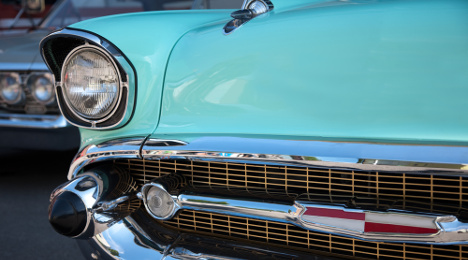Dealers & Auctions to Benefit from Classic Car Demand

By subscribing, you agree to receive communications from Auto Remarketing and our partners in accordance with our Privacy Policy. We may share your information with select partners and sponsors who may contact you about their products and services. You may unsubscribe at any time.
NEW YORK –
Auctions and dealerships that have a strong business interest in how classic cars are moving on the wholesale and retail fronts should be pleased to hear the upbeat projections from IBISWorld, which said the industry appears “to be back on the right track.”
The firm’s latest report showed that revenue is estimated to increase during the next five years, including a “robust” jump this year.
“Classic cars are highly discretionary purchases; therefore, demand for the industry is extremely elastic among most U.S. consumers and depends on prevailing levels of per capita disposable income,” IBISWorld economic analyst Nick Petrillo said.
When per capita disposable income levels fell and investor uncertainty increased during the recession, Petrillo explained that fewer consumers purchased classic and antique cars.
“Although per capita disposable income has gradually returned from its historic lows, many middle-class consumers have yet to resume purchases of industry vehicles due to depleted savings and relative disinterest in spending money on such high-priced assets,” Petrillo said.
With the economic recovery likely to yield greater purchases on classic cars from both wealthy investors and the general public, IBISWorld anticipates industry revenue to steadily grow over the five years to 2020.
Subscribe to Auto Remarketing to stay informed and stay ahead.
By subscribing, you agree to receive communications from Auto Remarketing and our partners in accordance with our Privacy Policy. We may share your information with select partners and sponsors who may contact you about their products and services. You may unsubscribe at any time.
Analysts projected demand for classic cars of all makes and models is anticipated to grow, although budget classics and American muscle cars are most poised for growth.
The IBISWorld report also highlighted dealers will benefit from higher demand for classic cars, which will likely push up auction prices on many of the industry’s most popular models.
“Higher auction prices will ultimately boost industry profit margins over the next five years as a result,” Petrillo said.
Nevertheless, Petrillo acknowledged long-term industry growth prospects will be limited by external competition from many individuals throughout the United States who own and sell classic cars amongst themselves.
“Independent sales of automobiles are extremely common and represent an increasing threat to the industry, particularly as consumers gradually increase their use of online classifieds to advertise their automobiles to a national audience,” Petrillo said.
“New-car dealers will also represent a major source of competition for industry dealers as major manufacturers have begun a trend of modernizing classic models and retailing them as modern, state-of-the-art collectibles,” he went on to say.


